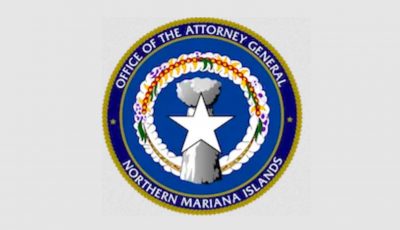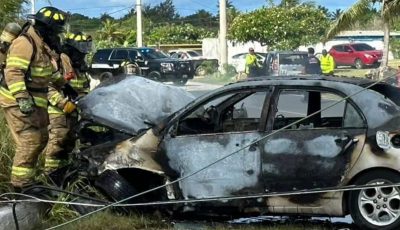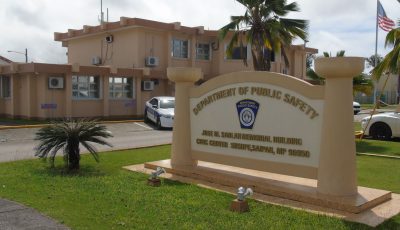OAG sanctioned for ‘frivolous’ appeal in Sablan’s traffic case
The CNMI Supreme Court has sanctioned the CNMI government for filing a frivolous appeal over the acquittal of former education commissioner Dr. Rita A. Sablan in a traffic case.
The justices ordered the Office of the Attorney General pay the high court’s clerk $150 as sanction and Sablan $150 in single cost incurred in the appeal.
The justices dismissed the government’s appeal.
Because Superior Court Associate Judge Joseph N. Camacho did not invalidate a statute but merely clarified the term “owned or leased,” the Commonwealth had no right to appeal Camacho’s judgment, said the high court opinion penned Friday by Chief Justice Alexandro C. Castro and concurred by Associate Justices John A. Manglona and Perry B. Inos.
Accordingly, the justices said, they find the government’s appeal frivolous as it had no prospect of succeeding on the merits.
In a footnote to their order, the justices said their decision does not foreclose the government’s right to appeal a criminal case where a statute had been held invalid.
“In the future, the Commonwealth is recommended to state in its notice of appeal that it is seeking a bifurcated appellate review on a point of law from a judgment of acquittal,” the justices said.
At a bench trial last April 27, Camacho found Sablan not guilty of the violation of restriction upon use of government vehicles such as driving a government vehicle that does not bear a government license plate, driving an unmarked government vehicle, and operating a government vehicle with tinting on its windows.
In granting Sablan’s motion for acquittal, Camacho found that the prosecution has failed to prove beyond reasonable doubt that the car being driven by Sablan is a government vehicle as defined in the Traffic Code, requiring a lease of 12 months or more.
Camacho ruled that because the lease agreement was expired, the law no longer requires the car to be considered a government vehicle. Because the car was no longer a government vehicle, it was no longer required to display a government license plate and markings and removal of tinting material.
The vehicle in question, a four-door 2011 Honda Accord sedan, is registered to “Joeten Motor Dept.” and leased to the Public School System.
The government appealed the judgment of acquittal. Subsequently, Sablan, through assistant attorney general Brien Sers Nicholas, sought to have the appeal dismissed and the government sanctioned.
Nicholas argued that the appeal is frivolous because a judgment of acquittal is not appealable.
In response, the government, through assistant attorney general Matthew C. Baisley, moved for a voluntary dismissal of the appeal and opposed Sablan’s motion for sanctions.
Baisley argued that the appeal is not frivolous because the statute allows the government to appeal on a point of law without seeking reversal of an acquittal.
Baisley argued that Camacho invalidated the term “or leased” in the statute as applied by “requiring ownership in all cases, either actual ownership, or constructive ownership accomplished by entering into a lease agreement of sufficient duration.”
In dismissing the appeal, the justices said they find no merit to the government’s argument.
The justices said Camacho did not hold Section 7406(a)(2) unconstitutional when applied to Sablan’s situation.
Section 7406(a)(2) defines government vehicle as a “vehicle owned or leased by the Commonwealth government or any of its branches or political subdivisions.”
The justices said Camacho merely engaged in a statutory interpretation to determine whether Sablan’s conduct violated the statutes.
In so doing, the justices said, Camacho evaluated whether the vehicle in question was “owned or leased” by the government by construing “owned or leased” pursuant to the Vehicle Code.
The justices said because Camacho did not invalidate Section 7406(2), but merely clarified the term owned or leased, the government had no right to appeal the judgment.
The justices, however, stated that they do not decide whether Camacho did or did not accurately interpret Section 7406(a)(2).
Sablan requested the high court to impose sanctions under the NMI Supreme Court Rule 38 because the appeal is frivolous. Under Rule 38, the high court may award damages including attorney fees and single or double costs to an appellee if they find an appeal frivolous.
The justices said they are not persuaded Rule 38 sanction is appropriate.
The justice said the government’s appeal was to challenge Camacho’s ruling on a question of law; it was not to reverse a finding of not guilty.
Accordingly, the justices said, Sablan had no personal stake in the appeal—no actual or threat of injury—and had no burden to defend it.
“Therefore, to the extent Sablan incurred costs in defending the appeal, those costs are hers to bear,” the justices said.
The justices said Sablan’s costs could have been prevented had she given the Commonwealth an opportunity to identify the nature of the appeal in its docketing statement before moving to dismiss the appeal.
Nevertheless, the justices said, they found the appeal frivolous, and concluded that some degree of sanction is warranted. By failing to properly specify the matter for appeal, the Commonwealth unnecessarily muddied the waters, the justices said.
Thus, the justices said, Sablan’s confusion and response in the face of the Commonwealth’s action is reasonable.
Accordingly, the justices said, though Rule 38 sanction is not warranted as a matter of law, they invoke their inherent authority as an alternate ground to impose monetary sanctions against the Commonwealth for filing a frivolous appeal and deficient notice of appeal.
The prosecution alleged that the lease of the car began Jan. 1, 2014, and Sablan was stopped by a police sergeant on Navy Hill on Jan. 15, 2015, so the government is legally the owner of the vehicle.
Then-assistant attorney general Emily Cohen prosecuted the case.



























